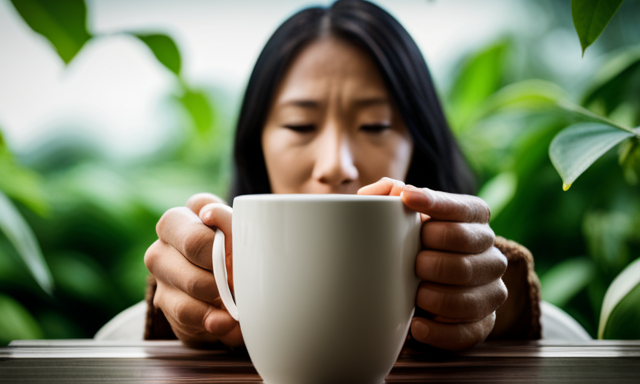Did you know that oolong tea has been enjoyed for centuries and is known to provide numerous health benefits? With its origins dating back to ancient China, oolong tea has become a popular beverage worldwide due to its unique taste and potential wellness advantages. As someone who is passionate about leading a healthy lifestyle, I am excited to share with you the fascinating information I have discovered about oolong tea and its impact on our well-being.
In this article, we will delve into the origins and history of oolong tea, uncovering its rich cultural significance. We will also explore the various health benefits associated with this tea, and how much you should consume daily to maximize its potential advantages.
Additionally, we will discuss the factors that influence the health benefits of oolong tea, potential side effects, and precautions to keep in mind. Furthermore, we will compare oolong tea to other types of tea, providing you with a comprehensive understanding of its unique qualities.
So, grab a cup of oolong tea, sit back, and let’s dive into the world of this remarkable beverage together.
Key Takeaways
- Oolong tea offers a range of health benefits, including boosting metabolism, reducing fat absorption, regulating blood sugar levels, and improving heart health.
- The flavor profile of oolong tea is diverse, offering a balance between floral and fruity notes, as well as rich and robust flavors. It caters to every palate with light and floral varieties, as well as bold and roasted varieties.
- Oolong tea contains antioxidants, such as polyphenols, that protect against oxidative stress, reduce the risk of chronic diseases, promote overall well-being, and support skin health.
- Oolong tea has calming effects due to the presence of L-theanine, an amino acid. It promotes relaxation, enhances mental alertness, helps in reducing stress, and supports a calm state of mind.
The Origins and History of Oolong Tea
Get ready to embark on a fascinating journey as we delve into the rich origins and captivating history of oolong tea!
Oolong tea, also known as Wu Long tea, has its roots in China and Taiwan. The origins of this unique tea can be traced back to the Qing Dynasty, where it gained popularity among the royal court. Oolong tea holds immense cultural significance in these regions, with elaborate tea ceremonies and rituals being an integral part of their traditions.
The production process of oolong tea involves withering, oxidation, and fermentation, resulting in a tea that falls between green and black teas. This intricate process contributes to the distinct flavor and aroma of oolong tea. Its delicate balance of floral, fruity, and toasty notes makes it a favorite among tea enthusiasts.
Understanding the health benefits of oolong tea is the next step in appreciating this remarkable beverage.
Understanding the Health Benefits of Oolong Tea
Gaining a comprehension of the advantageous effects of oolong tea on well-being is essential.
Oolong tea is known for its antioxidant properties, which can help protect the body against damage from harmful free radicals. This tea contains polyphenols, which are powerful antioxidants that may reduce the risk of chronic diseases, such as heart disease and cancer.
Additionally, oolong tea has been studied for its potential weight loss effects. It may help boost metabolism and increase fat burning, making it a popular choice for those looking to shed a few pounds. However, it’s important to note that more research is needed to fully understand the extent of these benefits.
Moving forward, let’s explore the recommended daily consumption of oolong tea.
Recommended Daily Consumption of Oolong Tea
To fully experience the potential advantages of oolong tea, it is recommended to incorporate it into your daily routine. As the saying goes, ‘A cup a day keeps the doctor away.’ The recommended intake of oolong tea varies depending on factors such as age, overall health, and individual tolerance.
However, studies suggest that consuming 2-3 cups per day can provide health benefits. Oolong tea contains antioxidants, such as polyphenols and catechins, which can help reduce the risk of chronic diseases like heart disease and cancer. It may also support weight management, improve digestion, and boost brain function.
However, it’s important to note that excessive consumption of oolong tea can have health risks. These risks include caffeine sensitivity, digestive issues, and interference with certain medications. Therefore, it’s best to consult with a healthcare professional to determine the appropriate intake for your specific needs.
Moving on to factors that influence the health benefits of oolong tea…
Factors that Influence the Health Benefits of Oolong Tea
When it comes to the health benefits of oolong tea, there are several factors that can influence its effectiveness.
The quality and processing methods of the tea leaves, the brewing techniques used, and the timing and frequency of consumption all play a role in determining the extent of the health benefits one can derive from oolong tea.
It is important to consider these factors in order to maximize the potential benefits of incorporating oolong tea into your daily routine.
Quality and Processing Methods
Get ready to discover the incredible health benefits that come from consuming high-quality, properly processed oolong tea.
The quality and processing methods of oolong tea play a crucial role in determining its health benefits.
High-quality oolong tea undergoes rigorous quality testing to ensure that it meets certain standards. This includes testing for factors such as taste, aroma, and appearance.
Additionally, traditional cultivation methods are often used to grow the tea leaves, which can contribute to its overall quality. These methods prioritize the use of natural fertilizers and pesticides, resulting in a more natural and healthier product.
Proper processing methods, such as withering, oxidation, and roasting, also play a significant role in enhancing the health benefits of oolong tea. These methods help to preserve the tea’s beneficial compounds and maintain its unique flavor profile.
As we delve into the subsequent section about brewing techniques, you will learn how to maximize the health benefits of your oolong tea.
Brewing Techniques
Brewing oolong tea using proper techniques can create a delightful and invigorating experience. A single cup can transport you to the serene tea gardens of Asia.
The brewing temperature and steeping time are crucial factors in achieving the perfect cup of oolong tea. To extract the optimal flavors and health benefits, it’s recommended to use water heated to around 185°F (85°C). Steeping the leaves for 3-5 minutes allows the tea to reach its full potential, releasing the intricate flavors and aromatic compounds.
However, different oolong tea varieties may have specific brewing requirements. It’s always a good idea to consult the instructions provided by the tea supplier.
Moving on to the timing and frequency of consumption, it’s important to consider the ideal intervals between enjoying this delightful beverage.
Timing and Frequency of Consumption
Timing and frequency of consumption are important factors to consider when enjoying oolong tea. To fully experience its benefits, it is recommended to consume oolong tea in the morning or early afternoon. This allows your body to absorb its antioxidants and gives you a gentle energy boost for the day.
In terms of frequency, incorporating two to three cups of oolong tea into your daily routine is ideal. This ensures a consistent intake of its health-promoting properties without overconsumption. However, it’s important to listen to your body and adjust accordingly.
Now, let’s explore the potential side effects and precautions associated with oolong tea.
Potential Side Effects and Precautions
Be cautious when consuming oolong tea as there may be some possible adverse effects that you should be aware of. While oolong tea is generally safe, it is important to take precautions and understand potential side effects.
Some individuals may experience caffeine sensitivity, leading to symptoms like insomnia, irritability, or increased heart rate.
It is also important to note that oolong tea contains tannins, which can interfere with the absorption of certain nutrients like iron and calcium.
To minimize these effects, it is recommended to consume oolong tea in moderation and avoid excessive intake.
Additionally, if you have any underlying health conditions or are taking medications, it is advisable to consult with a healthcare professional before incorporating oolong tea into your routine.
Understanding these precautions will help you make informed decisions about your oolong tea consumption.
Moving forward, let’s explore oolong tea and its role in traditional medicine.
Oolong Tea and its Role in Traditional Medicine
Explore the rich history of oolong tea and discover how it has been utilized in traditional medicine for centuries. Oolong tea holds a special place in traditional Chinese medicine, where it is believed to possess various health benefits. According to traditional Chinese medicine principles, oolong tea is considered to have a cooling effect on the body, making it useful for treating conditions such as inflammation, skin disorders, and digestive issues. Additionally, oolong tea has been associated with weight loss due to its potential ability to increase metabolism and fat oxidation. While scientific research on oolong tea’s role in traditional medicine is limited, some studies have shown promising results. It’s important to note that oolong tea should not be considered a cure-all, and consulting with a healthcare professional is advised. Moving forward, let’s explore how oolong tea compares to other types of tea.
Oolong Tea vs. Other Types of Tea
In a world full of tea options, oolong tea stands out like a diamond in the rough, with its unique flavor profile and potential health-boosting properties. Here are four reasons why oolong tea is a worthwhile addition to your tea collection:
-
Oolong tea benefits: Studies have shown that oolong tea may help with weight management by boosting metabolism and reducing fat absorption. It may also help regulate blood sugar levels and improve heart health.
-
Distinct flavors: Oolong tea offers a delightful balance between the floral and fruity notes of green tea and the rich, robust flavors of black tea. Whether you prefer a light, floral oolong or a bold, roasted variety, there’s a flavor profile to suit every palate.
-
Antioxidant powerhouse: Oolong tea contains antioxidants called polyphenols, which help protect the body against oxidative stress and reduce the risk of chronic diseases.
-
Calming effects: Oolong tea contains the amino acid L-theanine, which promotes relaxation and mental alertness.
Incorporating oolong tea into your daily routine can be a simple and enjoyable way to reap its many benefits. Now, let’s explore how to make oolong tea a part of your everyday life.
Incorporating Oolong Tea into Your Daily Routine
Adding oolong tea to your daily routine can enhance your overall well-being and elevate your tea experience. Oolong tea is known for its potential benefits in weight loss and skin health.
Studies have shown that oolong tea may help boost metabolism and promote fat burning, making it a popular choice for those looking to shed extra pounds. Additionally, oolong tea contains antioxidants that can help improve skin health by reducing inflammation and protecting against damage from harmful free radicals.
To incorporate oolong tea into your daily routine, start by replacing your usual morning coffee with a cup of oolong tea. You can also enjoy it as a refreshing drink throughout the day or as a soothing bedtime tea.
Next, let’s explore some delicious oolong tea recipes and variations to further enhance your tea experience.
Oolong Tea Recipes and Variations
Try spicing up your tea routine by adding a squeeze of fresh lemon and a drizzle of honey to a steaming cup of oolong; the tartness of the lemon and the sweetness of the honey create a delightful balance of flavors that will make you feel refreshed and invigorated. Oolong tea is not only delicious but also offers numerous health benefits. It is rich in antioxidants, which help protect against chronic diseases and promote overall well-being. The unique combination of polyphenols and catechins found in oolong tea may aid in weight management and boost metabolism. Moreover, oolong tea comes in a variety of flavors, such as floral, fruity, and toasty, allowing you to explore different tastes and find your favorite. So why not indulge in a cup of oolong tea and reap its wonderful benefits? Transitioning into the conclusion, let’s further explore the health benefits of oolong tea.
Conclusion: Embracing the Health Benefits of Oolong Tea
Indulge in the delicate flavors of oolong tea and experience a rejuvenating journey towards overall well-being.
Oolong tea is not only a delicious beverage, but it also offers numerous health benefits. By embracing the health benefits of oolong tea, you can improve your physical and mental well-being.
Oolong tea is rich in antioxidants, which can help reduce the risk of chronic diseases, such as heart disease and certain types of cancer. It also contains polyphenols and catechins, which have been shown to boost metabolism and aid in weight loss.
Additionally, oolong tea can help improve brain function, promote healthy digestion, and strengthen the immune system.
Understanding the advantages of oolong tea can empower you to make it a regular part of your wellness routine. So, go ahead and savor a cup of oolong tea to reap its many benefits.
Frequently Asked Questions
Can oolong tea help with weight loss?
Oolong tea has been shown to have potential benefits for weight loss by increasing metabolism and fat oxidation. However, it’s important to note that the effectiveness of oolong tea in reducing body fat may vary between individuals.
Does oolong tea contain caffeine?
Yes, oolong tea contains caffeine, but compared to other caffeinated beverages, it has a milder effect. The health benefits of caffeine in oolong tea include improved mental alertness, increased metabolism, and enhanced physical performance.
Are there any specific health conditions that oolong tea can help with?
Oolong tea may benefit heart health by reducing cholesterol and blood pressure levels. It may also aid in diabetes management by improving insulin sensitivity. However, further research is needed to fully understand these effects.
What is the best time of day to drink oolong tea for maximum health benefits?
The optimal brewing time for oolong tea to maximize health benefits is in the morning or early afternoon. It is recommended to consume 2-3 cups per day, with each serving size being around 8 ounces.
Can oolong tea be consumed by pregnant or breastfeeding women?
During pregnancy, it’s important to be cautious about consuming oolong tea due to potential pregnancy concerns. Similarly, breastfeeding women should consider the effects of oolong tea on their milk supply and infant’s health.
Conclusion
How much oolong tea provides health benefits?
In order to reap the health benefits of oolong tea, it is important to understand the recommended amount to consume. While there is no specific daily dosage, experts suggest drinking two to three cups of oolong tea per day to experience its advantages. This moderate intake allows you to enjoy the tea’s antioxidant properties, which can help fight against free radicals and reduce the risk of chronic diseases.
Drinking oolong tea in moderation also ensures that you do not consume excessive amounts of caffeine. Oolong tea contains caffeine, although in smaller quantities compared to other types of tea or coffee. By limiting your intake to a few cups a day, you can avoid potential side effects such as jitters, insomnia, or increased heart rate.
It is worth noting that individual tolerance to caffeine may vary, so it is important to listen to your body and adjust your consumption accordingly. If you are sensitive to caffeine or have any underlying health conditions, it is recommended to consult with a healthcare professional before incorporating oolong tea into your routine.
In summary, consuming two to three cups of oolong tea per day is a reasonable amount to enjoy its health benefits while avoiding excessive caffeine intake. Moderation is key to reaping the advantages of this beverage and maintaining a balanced lifestyle. So, pour yourself a cup or two of oolong tea and savor its numerous health benefits.










